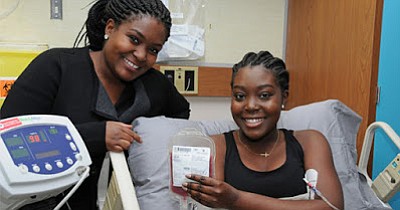Black Woman From Canada Among One of the First Patients to be Cured of Sickle Cell Anemia
Style Magazine Newswire | 5/14/2018, 4:14 p.m.
Source: The Minority/Black Health Blog
Revee Agyepong, a 26-year-old Black woman from Canada, has been the first adult to be cured of sickle cell anemia. Through a stem cell transplant and with the help of her loving sister and the doctors, she became the living proof that it is possible to be healed of sickle cell anemia.
Having been diagnosed with the disease as a toddler, she has since lived with it. She shared, "I remember as far back as elementary feeling sickle cell complications and not knowing what it was. I thought that everyone would go out for recess and play, then come back with a terrible headache and body pain, couldn't breathe... eventually, I realized it was just me."
Sickle cell anemia is a genetic disease in which a person has abnormal hemoglobin that causes red blood cells to become semi-circular in shape and would block blood vessels. There are various symptoms in every patient but all of it could put the body organs at risk.
In Agyepong's case, the disease manifested as chronic bone and joint pain, irregular heartbeat, kidney stones, and shortness of breath.
Two years ago, the Alberta Children's Hospital declared successful treatment of sickle cell anemia in pediatric patients using stem cell transplant. Agyepong, however, was advised by her doctors that she was too old for the treatment and her health was, even more, declining at the time.
It is risky for an adult to undergo the procedure since it has higher chances to develop graft versus host disease, a serious immune rejection that could even cause death.
But her sister, Stephanie Amoah, said she could not help seeing her sister suffer anymore so she tried to find other centers that perform the procedure in adults.
"My sister has always been my protector, my guardian, she found a way," Agyepong said.
After consulting her doctor, Dr. Andrew Daly, who said they were actually considering to conduct the procedure in adults, they were set to proceed.
"My persistence, my sister's persistence, and they said my dedication to wanting a cure, was enough for them to just say, you know what, she's going to be the person, let's do this," Agyepong said.
And while there is only a 1 out of 4 chance that a sibling is a perfect match for the transplant, Amoah and Agyepong was a 100 percent match.
The transplant was conducted at Calgary's Tom Baker Cancer Centre. Agyepong was required to undergo a course of low-dose radiation and take drugs for suppressing her immune system. Meanwhile, Amoah underwent a process called apheresis that collected her healthy cells that will be given to Agyepong.
"Over the past few months, what we've seen is that Revée's sister's bone marrow has taken over the production of Revée's red blood cells," Daly said. "The amount of sickle cell hemoglobin in her bloodstream has decreased almost to zero."
Today, Agyepong's blood tests don't show any signs of the disease, which means she has been cured. Amoah was more than happy that she is now seeing the amazing changes in her sister.
"It's phenomenal. I'm just so happy to have been part of a process that will give her a new life, a new hope and be able to do the things she's always wanted to do," Amoah said.
Agyepong said she is still recovering from the treatment but in one year time, she has plans to be an advocate of the disease and fully experience life like how she wanted it to be.
"I want to travel somewhere exotic and somewhere warm and feel dehydration like anyone else would, because I couldn't with sickle cell, I would be dehydrated and end up in the hospital," she said.
"It sounds so insignificant but it's really exciting just to be able to be more spontaneous."
For more details about the healthcare facility that conducted the transplant, please visit www.albertacancer.ca/tom-baker-cancer-centre




